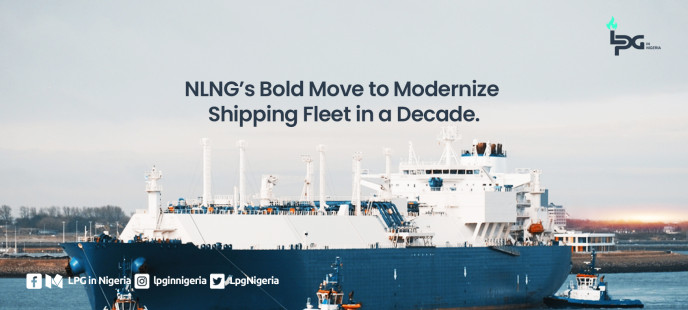- 3573
- 0
Sharing Ideas and Updates on LPG in Nigeria and related information to enable effective collaboration within the LPG Value Chain
NLNG’s Bold Move To Modernize Shipping Fleet In A Decade

Nigeria LNG (NLNG) is steering toward a greener future by replacing its steam-powered vessels with state-of-the-art modern ships over the next ten years. This ambitious plan was unveiled by Nnamdi Anowi, NLNG’s General Manager of Production, during the World Leaders’ Panel session at the 2024 World LNG Summit and Awards in Berlin, Germany.
“Earlier this year, we took a major step by entering into a long-term charter for our first modern ship, Aktoras, and we are already planning to acquire a second ship next year,” Anowi announced. This move aligns with NLNG’s broader commitment to achieving net-zero emissions by 2040, a goal supported by operational efficiency, natural sinks, carbon capture and storage (CCS), and digital solutions.
Anowi noted that while Nigeria’s net-zero target is set for 2060, NLNG’s proactive approach is a step ahead of many industry players aiming for 2050. “Our pathway to net zero demonstrates our commitment to leading by example,” he emphasized.
Anowi highlighted that shipping activities contribute 25% of NLNG’s total emissions, with operations accounting for the remaining 75%. “We are focusing on measurement, reduction, avoidance, and mitigation strategies to curb emissions. Our shipping modernization project is a cornerstone of this effort,” he explained.
Also, NLNG is exploring CCS projects in collaboration with the government and international oil companies, and is assessing potential reservoirs for carbon storage. In renewable energy, the company is investigating solar power projects for its offices in Abuja and Port Harcourt, marking another step toward sustainability.
Commitment to Domestic LPG Supply
Beyond its decarbonization efforts, NLNG has pledged 100% of its liquefied petroleum gas (LPG) production to the Nigerian market. Anowi stressed the importance of this commitment, citing alarming statistics: approximately 100,000 Nigerians die annually from smoke inhalation due to cooking with firewood, disproportionately affecting women and children.
As someone who has witnessed the transformative power of LPG in providing cleaner and more efficient cooking solutions, I find this commitment inspiring. By dedicating its entire LPG production to the domestic market, NLNG is addressing a critical issue head-on. This effort not only saves lives by reducing household air pollution but also alleviates the burden on women and children who often bear the brunt of traditional cooking methods. Moreover, it underscores the potential of LPG to catalyze a cleaner energy future in Nigeria.
I am of the opinion that NLNG’s forward-looking initiatives exemplify its dual commitment to innovation and sustainability. By addressing pressing challenges like energy accessibility, environmental health, and global emissions, the company is setting a benchmark for responsible energy practices in Africa and beyond.
For those of us in the LPG sector, this modernization effort also highlights the cascading benefits for the industry. Improved shipping efficiency ensures a more stable and reliable supply chain, making LPG even more accessible to underserved communities. This is a significant step in bridging the energy gap and fostering a healthier, more sustainable environment for millions of Nigerians.
“As we modernize our fleet and expand our low-carbon initiatives, we’re ensuring a sustainable energy future that balances environmental and economic needs,” Anowi concluded.
NLNG’s actions resonate with the summit’s theme: ‘Achieving the Balance Between Energy Security and Decarbonisation,’ positioning the company as a leader in the global energy transition.
















0 Comment.